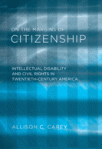Allison Carey, author of On the Margins of Citizenship, explains how her sister’s needs prompted her to write about disability rights. 
In 1971, when my sister was born with Down Syndrome, the state did not yet recognize the right of children with disabilities to attend school, nor were there many services offered in the community for people with disabilities. During her lifetime, much has changed, but much has remained the same. Even after the passage of an assortment laws to secure rights for people with intellectual and developmental disabilities, my sister still has difficulty finding integrated activities that will accommodate her disability; there is no public transportation where she lives to facilitate community integration; she has few friends of her age and little access to social recreation; her job options have largely been unfulfilling to her and her jobs have never lasted long; and, as someone who lives in the community with my father, she is not deemed to be in “emergency need” for services and therefore is largely ineligible for them. What then do her “rights” do to actually empower her or improve her quality of life?
On the Margins of Citizenship: Intellectual Disability and Civil Rights in Twentieth Century America emerged out of my growing interest in the Disability Rights Movement, and my awareness of its largely unrealized potential for people with developmental and intellectual disabilities. In this work I examine how rights have been conceptualized for people with intellectual disabilities throughout the 20th century, and why particular groups have fought for or against specific rights. Throughout this century, many tensions arose as Americans considered issues of rights for this population. For example, American policy tends to stray away from the provision of social rights for adults, yet the absence of social rights diminishes the effective exercise of other rights such as the rights to vote and to assemble. The provision of social rights tends to be reserved for people defined as incompetent or “needy”, yet this conceptualization undermines their status as worthy and active citizens. The American system of rights tends to prioritize rights that offer freedom to citizens to act as they wish (e.g. to worship as one wishes, to assemble with whom one wishes), yet people with intellectual disabilities are often deemed incompetent and dependent and therefore unable to exercise rights based on freedom.
This analysis draws upon a relational-practice approach to citizenship to argue that rights do not offer clear guarantees. Instead, rights offer potential resources to be claimed and negotiated, and the outcomes of the dynamic process of trying to exercise rights are highly dependent upon the immediate social context and the larger system of social stratification. For people with intellectual disabilities, who so often occupy a social position with little power, their “rights” are often undercut as they are defined by other citizens and by the courts as biologically or intellectually unable to exercise rights, as a threat to the rights of others, and as undeserving of the privilege and influence that are bestowed through the exercise of rights.
Therefore, it is unfortunately not surprising that the 10th anniversary of the Supreme Court decision Olmstead v. L.C. – a decision which found that unnecessary isolation and institutionalization constituted discrimination on the basis of disability – is marked with little success towards deinstitutionalization and instead the filing of a court case in Pennsylvania, charging that the state has yet to comply with the Olmstead decision. People with developmental and intellectual disabilities find that even after their rights are formally established, these rights are undermined and must be fought for again and again.
Filed under: american studies | Tagged: civil rights, disability, down syndrome |




Leave a comment